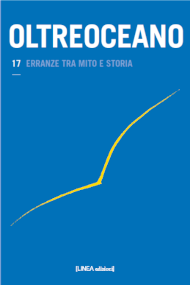The Quest Motif in the Travelogues and Memoirs of Migrant Writers
DOI:
https://doi.org/10.53154/Oltreoceano3Keywords:
quest motif, travel writing, migrationAbstract
Drawing on the analysis of travelogues and creative non-fiction by migrant subjects, this essay explores the multifaceted symbolic and metaphorical patterns of the quest motif, intended both as an anthropological urge for discovery and knowledge and as a more intimate psychological need to reshape identity and come to terms with the past and present.
Il motivo della quest nei racconti di viaggio e nelle memorie dei soggetti migranti
Attraverso l’analisi di racconti di viaggio e memorie autobiografiche di soggetti migranti, si esplorano i molteplici significati simbolici e metaforici del viaggio, inteso sia come necessità antropologica di scoperta e conoscenza, sia come un più intimo bisogno psicologico di riplasmare l’identità e confrontarsi con il passato e presente.
Downloads
References
Arapoglou, E., Fodor, M. & Nyman, J. (Eds.) (2013): Mobile Narratives: Travel, Migration, and Transculturation. New York: Routledge.
Bassnett, S. (2002): Travel Writing and Gender. In P. Hulme & T. Youngs (Eds.), The Cambridge Companion to Travel Writing (pp. 235-241). Cambridge: Cambridge University Press.
Buss, H. (1993): Mapping Our Selves: Canadian Women’s Autobiography in English. Montreal: McGill-Queen’s University Press.
Castles, S., de Hass, H. & Miller, M. (2014): The Age of Migration: International Population Movements in the Modern World. New York: Palgrave Macmillan.
Duncan, D. (2002): Travel Writing and Autobiography. In D. Duncan & C. Burdett (Eds.), Cultural Encounters: European Travel Writing in the 1930s (pp. 49-63). Oxford: Berghahn.
Eakin, J. P. (2008). Living Autobiographically: How We Create Identity in Narrative. Ithaca, NewYork: Cornell University Press.
Gunn, G. (2013): Tracks: Journeys in Time and Place. Vancouver: Signature.
Heaps, D. A. (2000): Gendered Discourse and Subjectivity in Travel Writing by Canadian Women. PhD Thesis, University of Toronto. Retrieved from https://tspace.library.utoronto.ca/handle/1807/14741
Heller, D. (1990): The Feminization of Quest-Romance: Radical Departures. Austin: University of Texas Press.
Kowalewski, M. (1992): Introduction: The Modern Literature of Travel. In M. Kowalewski (Ed.), Temperamental Journeys: Essays on the Modern Literature of Travel (pp. 1-16). Athens: University of Georgia Press.
Rosati, R. (2017): Maples & Chestnuts: A Memoir. Montreal: Longbridge Books.
Rosati, R. (2019): Aceri & Castagni: Memorie. Montreal: Longbridge Books.
Rothberg, M. (2009): Multidirectional Memory: Remembering the Holocaust in the Age of Decolonization. Stanford: Stanford University Press.
Tagg, J. (1988): The Burden of Representation: Essays on Photographies and Histories. Great Britain: University of Minnesota Press.
Downloads
Published
How to Cite
Issue
Section
License

This work is licensed under a Creative Commons Attribution-NonCommercial-ShareAlike 4.0 International License.
The authors undertake to comply with the following conditions, which are considered accepted at the time of submission of their contributions.
The sending of a text implies that it is unpublished and not submitted to be published elsewhere.
1. If accepted, the author shall confer on the publisher the right to publish and distribute it both in paper form and in the online electronic edition. The published articles will be downloadable and made available in open access.
2. Provided that it correctly indicates that the first publication took place in the journal Oltreoceano. Rivista sulle migrazioni the author has the right to: a) reproduce the article in separate extracts or collected in a volume; b) publish the article on their personal website or teaching site provided that these sites are of a non-commercial nature; c) deposit the article in online archives of a non-commercial nature, linked to the institution they belong to or as part of projects for the non-commercial dissemination and open access of scientific works.
The use of contributions by third parties, for commercial or otherwise unauthorized purposes, is not allowed. The publisher declines all responsibility for the unauthorized use of the material published in the journal.












